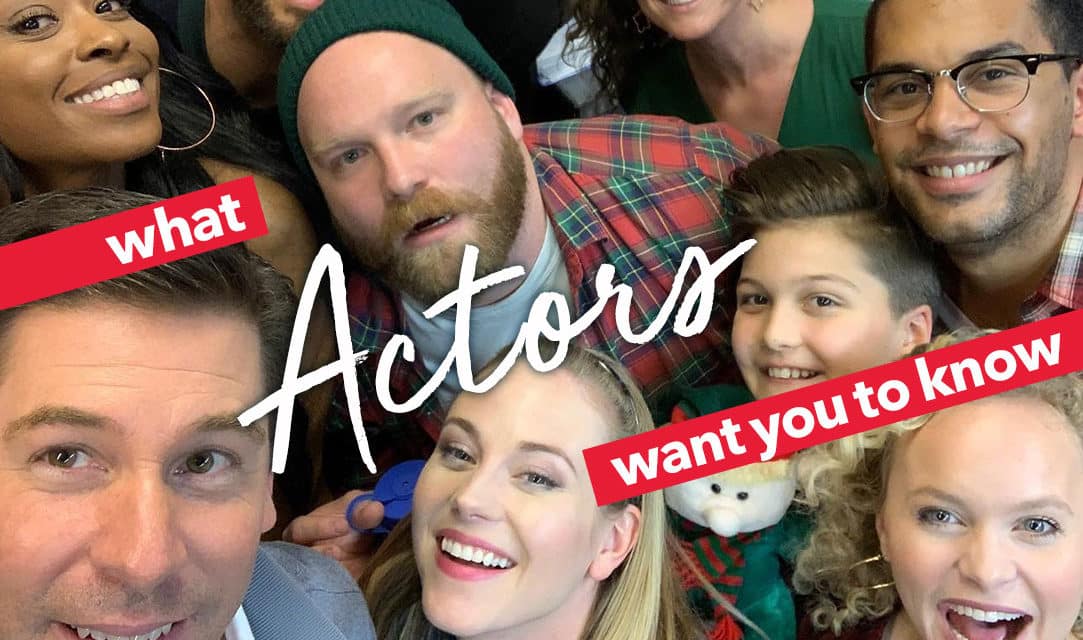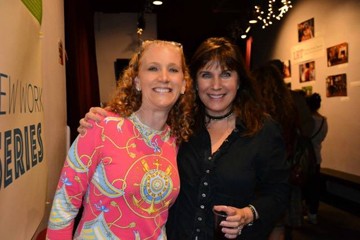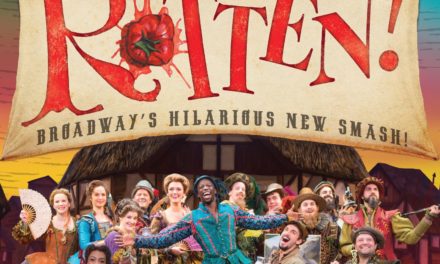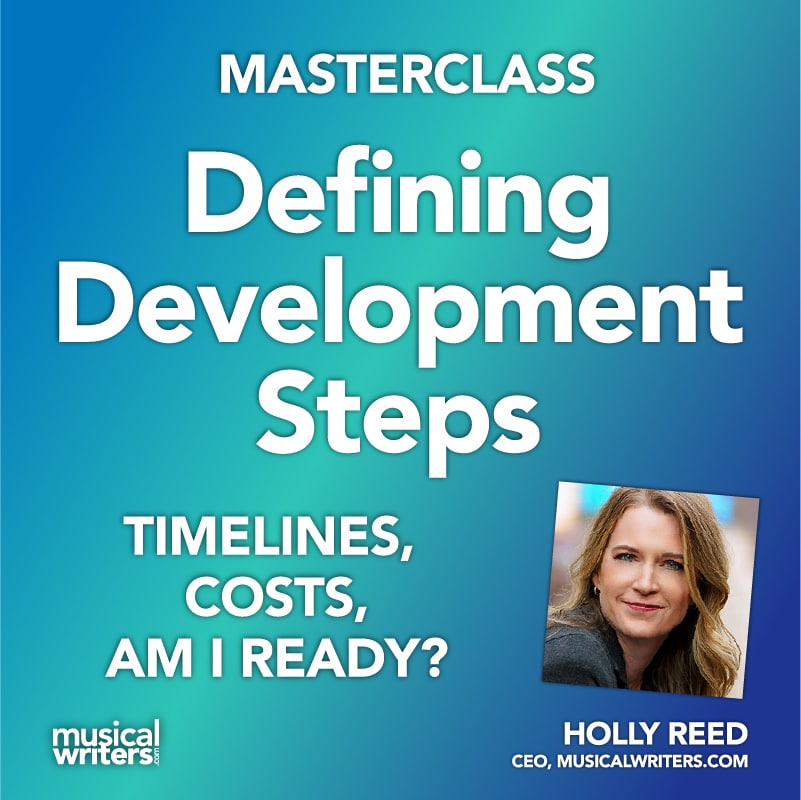As writers, we pour much of ourselves into the characters we create. We form them from nothing—carefully shaping and sculpting. But you know it isn’t the writer who breathes life into them, right?
It’s when an actor plunges into the pages of the script, stretches the skin of the character over himself, and emerges with a flesh-and-bone version of what once was only a concept—only then are our characters fully alive and three-dimensional.
If there’s one thing I can leave you with, it’s this:
INVOLVE YOUR ACTORS IN THE DEVELOPMENT PROCESS.
We have made major changes to our show because of the wisdom and insight of veteran Broadway actors who, after being in the character’s skin for a while, understood what he or she was feeling or thinking in ways we had not considered. We’ve adjustment moments, dialogue, and scenes because of their poignant feedback.
I asked several of the actors who have worked with us to speak to the creative development process from their perspective…here are their answers:
Note: To protect our actors’ privacy as well as shows they’ve worked on, I’m not crediting individual statements unless noted. These responses come from working Broadway actors and actresses with significant experience in both lead roles, featured roles, and developmental work. Listen to them.
What are common issues you see or hear in new musicals?
“Songs that don’t give the actor a clear want OR that overplay the want so there’s not subtlety. Songs that are too repetitive and long (Sondheim is brilliant at composing songs that have detail and nuance and a journey, and even though some songs are long, you’re still on the edge of your seat waiting to see what the character discovers next). Scenes that don’t finesse exposition and feel cheesy. Something that a teacher or director told me once was, remember that the audience is smart – you want to stay ahead of them. Don’t underestimate how smart an audience is. Once they’re ahead of you they become bored and you’ve lost them from the palm of your hand.”
“A lack of asking what everyone expects to get out of their collaborative relationship. I believe this is key to success.”
“I think a common issue that plagues new musicals is getting the opening number right. It’s a crucial part of introducing the world of the play to the audience. It introduces the characters, and sets up the tone of the world the audience is going to be living in for the next 2 to 3 hours. It has to grab your attention and get you invested. It’s a lot to put on that one tiny song’s shoulders, lol. That’s why the opening number is what normally goes through the most changes.”
~Jackie Burns (Wicked, Hair, If/Then)
“That’s kind of hard to pinpoint. There can be issues, but I find that they typically differ depending on the project. If I had to choose one, I have experienced a lot of writers butting heads with directors when cuts are suggested. I think sometimes it’s hard for writers to “let go” of pieces of their material when, in many cases, the show is just too long and really needs to be trimmed down.”
“My personal opinion is a lot of new musicals are afraid to allow more storytelling through scene work. They feel they just constantly need to get to the next song or they will lose the audience. I don’t think this is the case. I think the audience wants to connect to the characters and that is sometimes served best through scene work.”
How can writers better serve actors when writing?
“Think about what that character wants and needs—give the actor a treasure map of clues and text and goodness so they can pull from it to create! It’s always hard to give a good performance when writing is too ‘on the nose’ or cheesy or unrealistic. I love exploring what the subtext of the line is, like, what the character means versus what they say. Like humans, the character doesn’t always have to mean what they say. I love that. Also, clarity of relationships for the actor with other characters. As you’re writing songs, allow for the character to discover. Let the plot move ahead with the song, even if that part of the plot is a character’s new resolve or new decision. And be sure the song is saying something and isn’t just there as a filler. We love multi-dimensional characters! There can be moments of levity even in darkness, and drama even in a character who is light.”
“By spending more time in other positions in the craft. My understanding and empathy for every step of the process is always increased exponentially by serving other areas of the work. Whether it’s casting or costumes the collaborative effort will remain subconsciously at the forefront.”
~Major Attaway (Aladdin)
“I think that if writers give the actors a safe space to express what they are experiencing with the material, it benefits everyone. It’s not easy to critique a writer’s work as an actor, so if the writer is really open to hearing other perspectives, it sets everyone up for a more productive and creative experience.”
“Try not to be expositional. The audience is smarter than you think and doesn’t need everything spelled out. Allow the actors to have the text to get information out through an organic conversation. Once that scene work happens the director and actors will strip away anything unnecessary.”
Do you have any tips from a characterization perspective?
“Specificity in tone, language and action, but with room for the actor to interpret for themselves and create their version of your vision. Also – a clear ‘want’ is always helpful! And stakes! We don’t want to come watch normal life on stage…I think inherently we want to see what happens when there’s a problem or passion that needs to be resolved, the arc of that. Trust your actors. And make sure you cast people you know will be direct-able and flexible, but also bring their own creative spark. 🙂 Also, be careful when writing emotional scenes; ensure that there is an element of reserve. As humans we like to hold back our tears as best we can (which makes us cry more)—we don’t often weep without trying not to.”
“I like to max out the potential of the given circumstances for the world of the story. There is no starting point too outrageous to build from.”
“Being clear about your vision of the character, but also open to seeing what that actor unravels within their interpretation because everyone will offer something different. Actors love to feel safe and free in their exploration. When they do, they typically perform much better and discover more.”
~Kristen Martin (Wicked, Spiderman: Turn Off the Dark)
“I’d say when writing characters, try and find the characters that people want to be and don’t want to be. And then surround them with characters that will show us why we feel that way about them.”
Do you have any tips from a vocal arrangement perspective?
“Yes, be sure to understand the male and female voice as far as where breaks occur and what is actually taxing for a singer. Save the climactic moments for the vocally harder/higher notes – actors have to maintain 8 shows a week so be kind in how you write. 🙂 If the line doesn’t need to be on the break or loudly belted, don’t write it like that. It all adds up and can be exhausting. If you want your actors at the top of their game, write wisely. That doesn’t mean everything has to be easy, but constant difficulty and negotiation of the break is tricky for anybody. And it also becomes less exciting for the audience after a while. Write dynamically diverse. Also thinking about what vowels sound beautiful on certain notes.”
“Please keep reprises brief and purposeful. I find it very powerful to connect to a recurring theme, but theres a thin line between that and subliminal messaging.”
“Hire a great musical director! Haha! Truly though… when time is limited, and you have a bunch of theatre people with different musical backgrounds, you need a pretty incredible mind to navigate that. Someone who is organized and knows how to speak to the ones who don’t read music as well as read it.”
“My best tip is to not get overly complicated. Sometimes it feels like vocal arrangers do intricate arrangements to show off and not for what sounds best or serves the music best.”
What are mistakes you see from writers in the development process?
“I think it’s standard with any type of writing but cliches in the beginning are hard to avoid. As the piece gets worked out, the cliches lessen and the characters and simplicity of the story can come through. Collaboration is key! Y’all do such an amazing job of being open in the development process, championing your actors, listening to your team, it’s so refreshing!”
“Embracing an unfamiliar vernacular when it’s essential to the story being told. Especially when its completely foreign to them such as race or culture. History can create a bias that is unrecognized by the person functioning with it.”
“I would circle back to my answer from question 1 with this. I think not being able to let go of parts of the show or music that aren’t serving the plot or developing of characters.”
“The most obvious mistake is when a writer is reluctant to make changes. When they think everything works or refuse to “kill their darlings”. Writers need to be like actors…be willing to try anything. Even if you know what you have is good. Trust the director. That seems to be the hardest thing for writers, which does make sense because the director is usually the one who starts changing the writer’s work.”
~Richard H. Blake (Legally Blonde, Wicked, A Bronx Tale)
Next steps: Find out what YOUR actors want you to know!
Let me encourage you to create a warm, respectful, collaborative environment, and GIVE EVERYONE OPPORTUNITY TO SHARE. Pick your team wisely. You’ll be spending lots of time with these people. They’ll become family, and they’ll be the ones you want to celebrate with in the end.



















I LOVE this post! I actively solicit contributions from my actors. I have tried to create a community of actors who I work with on multiple projects over time. For one of my short musicals, I had the actors improvise the situation of the play as a fairly early step in the process. One of the actors acted out a panic attack for his character. That became a major development in the musical. Just last weekend, I got to have one of my musicals performed, and the lead, who has been playing the part during development over the last year, goes through a major empowering transformation during the climactic song. She came up with the idea of wearing a red dress under her black costume and taking it off to reveal the red dress underneath. It was amazing.
I do everything I can think of to encourage community and participation. One thing I do is start emails with salutations like “Dear Brilliant and Talented Actors”. I learned it from another director. It sounds cheesy, but it’s amazing how well it works for them and for ME in cultivating an atmosphere of warmth and collaboration.
I once went to law school, and one thing I do that may seem counter-intuitive is have writers sign a work for hire agreement that says that I retain ownership even if they make a contribution. I pay actors pretty well and I’ve never had a problem with it. It may rub you the wrong way, but Chorus Line and some other shows have had problems involving this issue.
Love this, Ed!